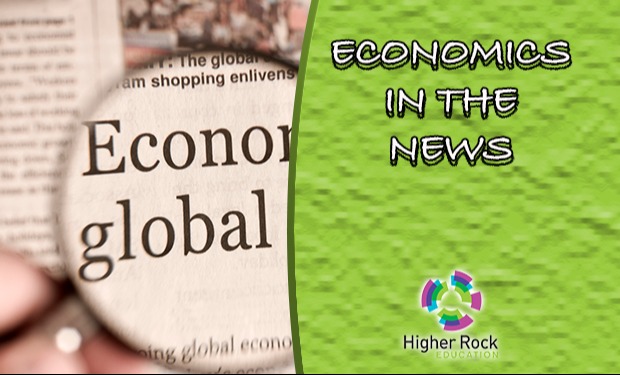
Economics in the News – Aug. 11-17, 2025
Economics impacts our lives every day. Below are some of the top storylines from this past week related to economics.
o The Public Broadcasting Service (PBS) is slashing its budget by more than 20 percent after the federal government eliminated more than $500 million in federal funding for public TV and radio. In addition, the PBS board elected to reduce dues paid by local stations by $35 million, leaving less revenue for its member stations and putting the pressure on the stations to make up for the shortfalls on their own.
The impact of the federal government budget cuts have a greater impact on PBS than on National Public Radio (NPR) because PBS has relied on the Corporation for Public Broadcasting more than NPR has. While it’s not known what budget cuts mean for day-to-day operations, it likely means that staff reductions will be necessary. While PBS and NPR are likely to survive, many other smaller radio and TV stations that serve rural areas and count on funding from the Corporation for Public Broadcasting are likely to go dark. [The New York Times]
o Taylor Swift unveiled her new album, she did so in a non-traditional way. Swift promoted her new album on the “New Heights” podcast co-hosted by her boyfriend and Kansas City Chiefs tight end Travis Kelce. The episode amassed nearly nine million views in 12 hours on YouTube, setting a record for the show. Additionally, 1.3 million tuned in for the episode simultaneously before it experienced a technical glitch.
It has become more common for celebrities to promote their work and projects in a comfortable setting rather than traditional outlets. It’s a space in which the conversation can flow freely. “The Joe Rogan Experience Podcast” was the talk of the political universe when then Presidential nominee Donald Trump appeared on the show, amassing 11 million views in its first 12 hours on YouTube. The “New Heights” podcast will also benefit from Swift’s appearance as well, boosting their advertising revenue on the No. 1 rated podcast on Apple Podcasts charts. [The New York Times]
o Opting to buy a used car to save money is getting more difficult. That’s because used car prices are rising faster than new car prices. The supply crunch during the pandemic means that fewer used cars are available today. The average price of a three-year old used car crossed $30,000 earlier this year, marking the highest price since 2022. In addition, more people are opting to buy their leased cars instead of returning them.
So far, automakers have absorbed the across-the-board price hikes of new models despite of President Donald Trump’s tariff policies. The 2026 models could see significant price increases, as rising prices for both new and used cars are expected to damp overall demand for the year. [The Wall Street Journal]
o In the restaurant industry, fast-food restaurants are citing traffic declines among its sales, cautioning that customers are becoming more price sensitive. However, sit-down restaurants such as Chili’s are seeing a resurgence with a 24 percent increase in same-store sales last quarter compared with a year prior. Other restaurant chains, such as Olive Garden and The Cheesecake Factory are also seeing an increase in sales, as diners still have the appetite for a special night out.
The value gap has played an important role. Although eating out has become more expensive everywhere, sit-down restaurants are less impacted than their fast-food counterparts. One reason is that casual-dining brands tend to operate a larger share of company-owned restaurants, giving management tighter control over pricing and promotions. [The Wall Street Journal]
o As customers seek out alternative options amidst President Donald Trump’s tariff policies, companies are banking on their brand loyalty in keeping customers choosing their products. Ralph Lauren leveraged price increases while demonstrating its products as high quality, appealing – in the current economic climate – to wealthier consumers retreating from traditional luxury and middle-income consumers becoming more selective about their spending.
Economists expect prices to increase at a more rapid pace, as retailers run out of inventory that they front-loaded before tariffs kicked in. Ralph Lauren, a middle-of-the-road luxury brand is seeking to capitalize on those customers fed up with paying the high prices of Louis Vuitton, Christian Dior or Gucci, while still offering high-quality goods. The brand has added 1.4 million new customers to its direct-to-customer business and saw its net revenue climb by 14 percent in its first quarter over last year. Analysts warn that not all brands will get away with easily raising prices, as customers could opt for less expensive alternatives. [The Washington Post]